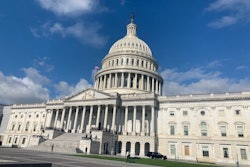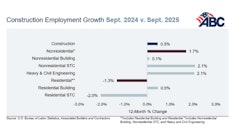
The House and Senate Feb. 14 overwhelmingly approved the final seven FY 2019 spending bills after nearly five months of short-term extensions and the longest government shutdown in U.S. history. President Donald Trump Feb. 15 signed the legislation despite the lack of southern border wall funding included in the Homeland Security portion of the package.
The law includes full FAST Act surface transportation law funding for core highway and transit programs totaling $49.3B, a $1.8 billion increase over FY 2018 levels. It also contains $5.5 billion in additional general revenue funding for surface and aviation capital investments as the second part of a two-year bipartisan budget agreement reached in 2018. Here’s the breakdown:
In a Feb. 14 letter, the ARTBA co-chaired Transportation Construction Coalition (TCC) urged all members of the House and Senate to support the package.
The completion of the FY 2019 funding bills is important to the transportation construction industry for multiple reasons:
- States will receive their full-year spending authority, which should ease uncertainty and allow their transportation departments to continue developing planned projects;
- Congressional leadership and Trump administration officials can focus on other areas of potential agreement, such as the enactment of a robust infrastructure package in 2019; and
- the Trump administration can send its FY 2020 budget to Congress, allowing senators and representatives to begin working on the next round spending bills.
The bill also instructs the Federal Highway Administration to evaluate the impact of autonomous vehicles, particularly commercial vehicles, on pavement service life. For aviation programs the bill provides $3.35 billion for the Airport Improvement Program (AIP) and an additional $500 million from the general fund in AIP discretionary grants, with no restriction on which airports can receive the additional fund. With the legislation finally enacted, state departments of transportation will receive their full year allocations and can plan for the 2019 construction season.




















